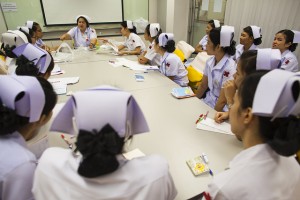Rebecka Rosenquist, Olga Golichenko, Tim Roosen, and Julia Ravenscroft

Photo Courtesy of The World Bank via Flickr
This article explores how nascent civil society ‘movements’ are working towards achieving universal health coverage (UHC), why the involvement of civil society is essential for delivering a universal and inclusive system as well as how the growing number of civil society voices contributing to this debate conceptualise UHC in future global health governance. It focuses on civil society action on UHC at the global level as well as within Ghana, Thailand and Uganda.
Civil society actors are adding their voices to the debates about UHC and this has powerful implications for the success of defining and achieving it. The authors argue that civil society should strive to define UHC and promote it as part of a global movement committed to health equity and solidarity. Further, that coverage should be framed in a forward-looking dynamic manner, recognising human rights and equity, and the need to embed them into global governance.

